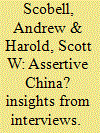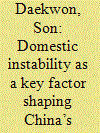| Srl | Item |
| 1 |
ID:
122596


|
|
|
|
|
| Publication |
2013.
|
| Summary/Abstract |
Recent years have witnessed the emergence of a more assertive China. What happened to China's "peaceful rise" and "charm offensive"? What explains the changes in China's foreign policy? According to interviews with Beijing and Shanghai-based analysts, China's assertiveness between 2008 and 2010 can be divided into two waves, each triggered by a different cause. The first wave seems triggered by a sense in Beijing that Washington, DC was more differential to China's interests, and less committed to East Asia. The second wave seems best explained as China's response to what it perceived as a far more assertive and threatening United States. Both waves were amplified by two domestic challenges: Chinese leaders' hypersensitivity to popular nationalism and poor bureaucratic coordination among an expanding number of foreign policy actors.
|
|
|
|
|
|
|
|
|
|
|
|
|
|
|
|
| 2 |
ID:
171080


|
|
|
|
|
| Summary/Abstract |
This study explores the domestic determinants of China’s intervention in the Korean War. Since the war, scholars have produced a large number of studies on the motivations behind China’s intervention in the war. These previous studies paid scant attention to domestic aspects, all of them assuming, albeit implicitly, that Party leaders could readily harness all available domestic resources and devote them to their political ends and that the public was willing to sacrifice their material resources and lives in order to satisfy the leaders’ political goals. By contrast, this study, based on extensive newly unearthed archival documents, argues that very unfavorable domestic circumstances helped shape the CCP’s strategy both before and after the outbreak of the Korean War. The domestic challenges not only provided the rationale for the CCP’s opposition to Kim Il-Sung’s Korean War plan before June 1950 but also gave an internal impetus for China’s vacillation in decision making and affected Mao’s final proactive decision to enter the war in October 1950.
|
|
|
|
|
|
|
|
|
|
|
|
|
|
|
|
| 3 |
ID:
177951


|
|
|